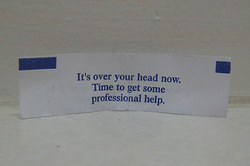What to Know When Registering Your Trademark
We received some exciting news a few weeks ago: PROFESSORWORD® is now a federal trademark registered with the U.S. Patent and Trademark Office (USPTO)!
If you’re thinking of registering a federal trademark for your startup, here are some of the things we learned from going through the process. Note that I am not a lawyer and this post is not intended to provide legal advice. I’m simply sharing what we learned from our experience.
1. Do your homework before you file.
 Filing to register a federal trademark is expensive. It costs $275+ to file an application and that doesn’t even include fees for lawyers. The last thing you want to do is spend the time and money to file an application, only to find out that the trademark is already taken.
Filing to register a federal trademark is expensive. It costs $275+ to file an application and that doesn’t even include fees for lawyers. The last thing you want to do is spend the time and money to file an application, only to find out that the trademark is already taken.
So do your homework before you begin and thoroughly research your startup and/or product name to make sure they are available. See my previous post about this topic. At a minimum, you should be searching the USPTO’s Trademark Electronic Search System (TESS) to make sure the trademark is available. Also, look at the applications of the trademarks registered by your competitors and peers to learn more about what is involved.
2. File early, because it may take a while.
 It took us 17 months from when we filed our application to when our trademark was registered. Our process took longer than expected, because we went through two rounds of Office actions with the USPTO (see below). The application process itself isn’t necessarily time consuming, because a lot of the time is spent waiting to hear back from the USPTO. But the overall timeframe can be long, so plan accordingly.
It took us 17 months from when we filed our application to when our trademark was registered. Our process took longer than expected, because we went through two rounds of Office actions with the USPTO (see below). The application process itself isn’t necessarily time consuming, because a lot of the time is spent waiting to hear back from the USPTO. But the overall timeframe can be long, so plan accordingly.
3. Get help. It’s worth it.
In a previous post, I talked about ways startups can save money on legal fees. Although you can DIY and file a trademark application yourself, I wouldn’t recommend it. There’s a lot of technical knowledge needed to prepare a strong application, so working with lawyers that specialize in intellectual property can make a big difference. On your own, it can be harder to distinguish between what is important and what isn’t.
It’s also common for applicants to receive Office actions where the USPTO requests further clarification on your application. Based on our experience, it would have been very difficult to understand the nuances in the requested clarification without having had legal help.
In our case, we were extremely lucky, as we were able to work with The Detkin Intellectual Property and Technology Legal Clinic at the University of Pennsylvania to file our trademark application. We are hugely indebted to the students and professors we worked with; a big thank you to Chanel, Francesco, Geri, Jeremy, Ioanna, Samar, and Professor Dahl. In my opinion, working with a legal clinic (see my previous post) is a great option for startups and I would strongly suggest using one if you have the option.
Until next time,
See also:
- What’s in a Startup Name? How to Choose One That Fits Your Company
- Startup Shortcuts: How to Find Low-Cost Legal Services
- The Mental Game of Being an Entrepreneur
- Finding the Right Incubator for your Ed-Tech Startup
Have questions or feedback? Comment below or let me know on Twitter @professorword!
Photo Credit: Flickr user tomsaint, tanakawho, lynn dombrowski


Also try searching on Trademarkia (http://www.trademarkia.com).
Thanks for the post, You have to know multiple things before getting a trademark. i.e: it is available? its cost and many other factors as well.